学习计划表Book1
个人英文学习计划表
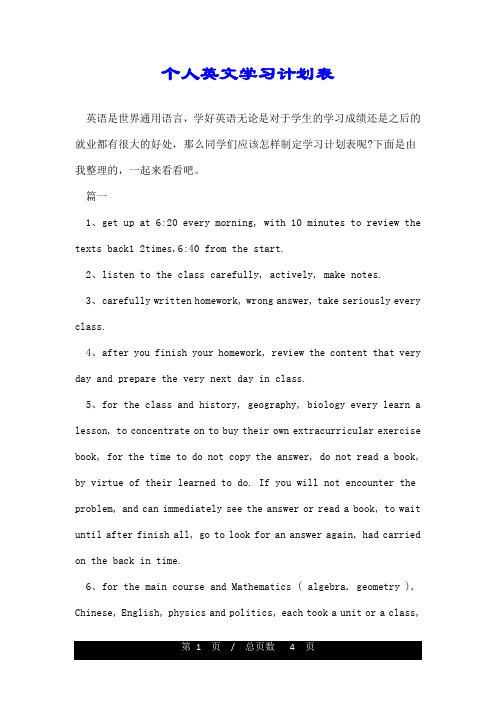
个人英文学习计划表英语是世界通用语言,学好英语无论是对于学生的学习成绩还是之后的就业都有很大的好处,那么同学们应该怎样制定学习计划表呢?下面是由我整理的,一起来看看吧。
篇一1、get up at 6:20 every morning, with 10 minutes to review the texts back1 2times,6:40 from the start.2、listen to the class carefully, actively, make notes.3、carefully written homework, wrong answer, take seriously every class.4、after you finish your homework, review the content that very day and prepare the very next day in class.5、for the class and history, geography, biology every learn a lesson, to concentrate on to buy their own extracurricular exercise book, for the time to do not copy the answer, do not read a book, by virtue of their learned to do. If you will not encounter the problem, and can immediately see the answer or read a book, to wait until after finish all, go to look for an answer again, had carried on the back in time.6、for the main course and Mathematics ( algebra, geometry ), Chinese, English, physics and politics, each took a unit or a class,to contrast" optimization" on the part of further deepen understanding and consolidated, and to do exercises, writing still can not copy the answer, after writing can make the teacher corrects or control, find the error corrected.7、have to time to ask the teacher or ask students, to understand.8、every night to listen to English for 30 minutes, training your listening.Maupassant said:" man lives in hope, a hope or to achieve, there will be a new generation of hope." Chinese New Year is the new hope, new hope, new journey, new harvest. The new semester, a new starting point, a new look, let us a vision of a better tomorrow, let us once again set foot on the journey篇二My campus activities are rich and colorful.Learning English has become a habit to me cause I plan to study abroad in next few years.Playing Guzheng is my favorite activity.I have kept on practising it since I was a little girl and I wish to win more competitions in my campus life.Our university has the first level equipments and the most experienced teachers,also has the best students(laugh).I consider it to be a honor that Ive got a chance to study here and I sincerely hope that we could live wonderful lives in our campus!篇三As the winter vacation is drawing near,I have a plan about my vacation.I am going to do what I want to do.I am going to study harder in order to get good grades in the following term.After finishing all my homework.I am going to enjoy myself in the sea of konwledge.Reading must be a good idea.I am going to keep fit at the same time.I will get up early in the morning everyday and play sports.I really love speats.Besides that,Eating a balanced diet is also good for my healthy.schedule:I will be in the third grade in the next term.Sin ce the highschool entrance examination is coming soon, there is a great need for me to make a precise plan of my studies.From September to November,I will follow the teachers in the new lessons learning, and after cla, the contemporary exercises are necessary.Before the end of the first term, I will review all the lessons from beginning again.From March to April, review all I have learned a second time. Beginning from April, models tests should be the all.Several days before the exam, I will go over all the mistakes in the pa-pe-rs and have a good rest for the exam.Today is March 8th, the new term, the last but the most important term of junior high has been on for more than seven days. It means that there are only about three months left for us to study. We suddenly feel that time passes so fast. We still remember the first day we come to this famous middle school, but now, two and a half years has passed. Have you ever looked back and thought, what you did and learnt in the two and a half years? And how much did you learn from teachers, books or in any other ways?To ask yourselves, have you ever wasted time? If you say "never", thats very good. But if you say "Yes, often," it is so regretful. But everything has passed anyhow, we cant get it back, so the only thing we can do is, to make better use of the time.From now on, study hard. Its not so late that everything cant be changed yet. Everything is possible only if you try your best to do it. Believe yourselves, "Every man has his price." Maybe you are good at study, you are good at singing or you do well in drawing...... So I always believe myself no matter where, no matter when. Its very important, I think. Lets try our best and put our heart into it. Wish you make good results in the last exam.。
新学期英语学习计划表

晚上8:00-9:00:预习第二天要学 习的内容
添加标题
添加标题
添加标题
添加标题
晚上7:00-8:00:复习当天学习的 内容
周末:整理一周学习的内容,进行 复习和预习
周学习计划
周一:词汇学习,背诵单 词和词组
周三:阅读理解,阅读英 语文章和书籍
周五:口语交流,与同学 和老师进行英语对话
语新闻等
每天安排固定的学习时间, 如早上背单词、晚上听英
语新闻等
定期检查学习进度,调整 学习计划,确保学习目标
的实现
4
学习方式
线上学习资源
英语学习网站:如BBC英 语、VOA英语等,提供丰 富的听力、阅读材料和练
习题。
英语学习视频:如 Yo u Tu b e 、 T E D 等 , 提 供各种英语演讲、讲座和
新学期英语学习 计划表
/单击此处添加副标题内容/
汇报人:
目 录
Part One.
学习目标
Part Two.
学习内容
Part Three.
学习时间安排
Part Four.
学习方式
Part Five.
评估与调整
1
学习目标
短期目标
提高词汇量:每天背 诵50个新单词
提高口语:每天练习 30分钟英语口语
学习方法:通过阅 读、写作、听力、 口语等实践锻炼语 法应用能力
学习资源:参考书 籍、网络课程、英 语角等
听力训练
材料选择:选择 适合自己水平的 英语材料,如 VOA、BBC、 CNN等
训练方法:每天 至少听30分钟, 可以分多次进行, 每次10-15分钟
精听与泛听结合: 精听时注意听细 节,泛听时注意 理解大意
英语学习计划表英文版
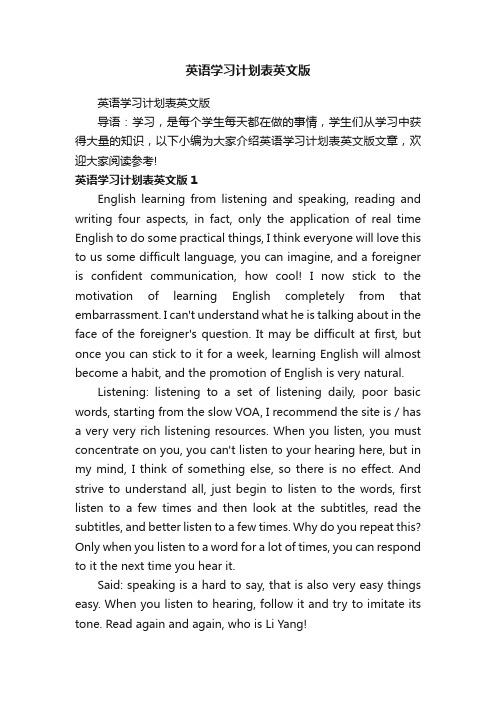
英语学习计划表英文版英语学习计划表英文版导语:学习,是每个学生每天都在做的事情,学生们从学习中获得大量的知识,以下小编为大家介绍英语学习计划表英文版文章,欢迎大家阅读参考!英语学习计划表英文版1English learning from listening and speaking, reading and writing four aspects, in fact, only the application of real time English to do some practical things, I think everyone will love this to us some difficult language, you can imagine, and a foreigner is confident communication, how cool! I now stick to the motivation of learning English completely from that embarrassment. I can't understand what he is talking about in the face of the foreigner's question. It may be difficult at first, but once you can stick to it for a week, learning English will almost become a habit, and the promotion of English is very natural.Listening: listening to a set of listening daily, poor basic words, starting from the slow VOA, I recommend the site is / has a very very rich listening resources. When you listen, you must concentrate on you, you can't listen to your hearing here, but in my mind, I think of something else, so there is no effect. And strive to understand all, just begin to listen to the words, first listen to a few times and then look at the subtitles, read the subtitles, and better listen to a few times. Why do you repeat this? Only when you listen to a word for a lot of times, you can respond to it the next time you hear it.Said: speaking is a hard to say, that is also very easy things easy. When you listen to hearing, follow it and try to imitate its tone. Read again and again, who is Li Yang!Reading: the key to the so-called reading is to understand the meaning of the article accurately and quickly. One of the bases for reading is the amount of words, and if the words are not enough, reading is pain, not enjoyment. So you have to memorize the words hard. No more than 20 every day, you can read the six words. But the words can be forgotten, and everyone is like this. One survey found that the greater the number of words, the faster the words were. So this is a process of accumulation. In the ordinary process of listening and speaking, we find out the words that will not be found. The next Youdao Dictionary is very good, and the words will not be put into Youdao Dictionary.The word book will remind you to review words in time, according to your memory curve, no matter how difficult the word is, so after several reviews, you can remember it thoroughly.Write: the first three steps persist. Writing is no longer difficult. At this time, it is a very simple thing to express oneself in English.In addition, I read more English movies and listen to some English lectures. What I think is a good Ted lecture is not only able to understand their progress, check their learning effects, but also bring happiness to English learning.The key to English learning is to stick to it, and the plan is not detailed enough. I will give advice on the progress of your study. When you insist on a period of time, it is sure to enjoy the fun, because when your level is improved, the sense of achievement will naturally bring fun. Come on.英语学习计划表英文版2I will be in the third grade now,Since the highschool entrance examination is coming soon, there is a great need for me to makea precise plan of my studies.From September to November,I will follow the teachers in the new lessons learning, and after class , the contemporary exercises are necessary.Before the end of the first term, I will review all the lessons from beginning again.From March to April, review all I have learned a second time.Beginning from April, models tests should be the all.Several days before the exam, I will go over all the mistakes in the papers and have a good rest for the exam.I hope this plan can further my studies.。
英语学习计划英语版带翻译

英语学习计划英语版带翻译IntroductionAs an English learner, one of my main goals is to improve my English skills to become more proficient in the language. To achieve this, I have developed a comprehensive English learning plan that focuses on improving my speaking, listening, reading, and writing skills. This plan will help me to stay organized and focused on my learning goals, and it will also provide me with a clear roadmap to follow in my journey to English proficiency.Goals1. Improve my speaking skills by practicing speaking English daily and participating in conversation exchanges with native English speakers.2. Enhance my listening skills by regularly listening to English podcasts, audiobooks, and watching English movies and TV shows.3. Develop my reading skills by reading English books, articles, and news on a daily basis.4. Strengthen my writing skills by writing in English regularly, such as keeping a journal or writing essays.Methods1. Speaking:a. Join English speaking groups or clubs to engage in conversations with native English speakers.b. Practice speaking English daily with friends or family members who are also learning English.c. Use language learning apps to practice speaking and improve pronunciation.2. Listening:a. Listen to English podcasts and audiobooks on a regular basis.b. Watch English movies and TV shows with English subtitles to improve listening comprehension.c. Use language learning apps to listen to English conversations and improve listening skills.3. Reading:a. Read English books, articles, and news on a daily basis to improve vocabulary and comprehension.b. Join English book clubs or reading groups to discuss English literature and improve reading skills.c. Use language learning apps to access English reading materials and track progress.4. Writing:a. Keep a journal in English to practice writing skills and record daily thoughts and experiences.b. Write essays on various topics in English to improve writing fluency and expression.c. Use language learning apps to receive feedback on written assignments and improve writing skills.ScheduleMy English learning plan will be divided into a weekly schedule that includes specific activities for each skill area. This schedule will help me to stay organized and focused on my learning goals, and it will also provide me with a clear roadmap to follow in my journey to English proficiency.Monday:- Speaking: Join an English speaking group or club and engage in conversations with native English speakers.- Listening: Listen to an English podcast or audiobook for 30 minutes.- Reading: Read an English article or news piece for 30 minutes.- Writing: Write a journal entry in English about the day's activities.Tuesday:- Speaking: Practice speaking English with a friend or family member for 30 minutes.- Listening: Watch an English movie or TV show with English subtitles for 1 hour.- Reading: Read a chapter of an English book for 30 minutes.- Writing: Write an essay in English on a chosen topic.Wednesday:- Speaking: Use a language learning app to practice speaking and improve pronunciation for 30 minutes.- Listening: Listen to an English podcast or audiobook for 30 minutes.- Reading: Read an English article or news piece for 30 minutes.- Writing: Write a journal entry in English about the day's activities.Thursday:- Speaking: Join an English speaking group or club and engage in conversations with native English speakers.- Listening: Watch an English movie or TV show with English subtitles for 1 hour.- Reading: Read a chapter of an English book for 30 minutes.- Writing: Write an essay in English on a chosen topic.Friday:- Speaking: Practice speaking English with a friend or family member for 30 minutes.- Listening: Listen to an English podcast or audiobook for 30 minutes.- Reading: Read an English article or news piece for 30 minutes.- Writing: Write a journal entry in English about the day's activities.Saturday:- Speaking: Use a language learning app to practice speaking and improve pronunciation for 30 minutes.- Listening: Listen to an English podcast or audiobook for 30 minutes.- Reading: Read a chapter of an English book for 30 minutes.- Writing: Write an essay in English on a chosen topic.Sunday:- Speaking: Practice speaking English with a friend or family member for 30 minutes.- Listening: Watch an English movie or TV show with English subtitles for 1 hour.- Reading: Read an English article or news piece for 30 minutes.- Writing: Write a journal entry in English about the day's activities.Progress TrackingTo track my progress, I will use a journal to record my daily activities related to speaking, listening, reading, and writing in English. Additionally, I will utilize language learning apps that provide progress tracking and feedback on my language skills. By keeping track of myprogress, I will be able to identify areas for improvement and adjust my learning plan accordingly.ConclusionIn conclusion, my English learning plan is designed to help me improve my English skills in speaking, listening, reading, and writing. By implementing specific methods and following a weekly schedule, I am confident that I will make significant progress in my English language proficiency. I am committed to staying focused and dedicated to my English learning plan in order to achieve my goals and become a fluent English speaker.(Word count: 847 words)我的英语学习计划介绍作为一名英语学习者,我的主要目标之一是提高自己的英语技能,以便更加熟练地掌握这门语言。
新初三暑假计划表英语学习

新初三暑假计划表英语学习English Learning Plan for the Summer Break of Fresh Junior Year.As the summer break of fresh junior year approaches, it's crucial to make a comprehensive learning plan to ensure progress in English. The following plan outlines a structured approach to enhance English proficiency during this period.1. Set Clear Goals:Begin by defining clear and measurable goals. These goals should align with your overall English proficiency and areas you wish to improve upon. For example, you might aim to increase your vocabulary size, improve grammar knowledge, or enhance reading comprehension.2. Daily Reading:Dedicate at least 30 minutes each day to reading English materials. This could include newspapers, novels, short stories, or even online articles. Reading regularly will help improve comprehension skills, vocabulary, and sentence structure.3. Vocabulary Building:Commit to learning a new word or phrase every day. You can use a vocabulary app, write the words down in a notebook, or create flashcards. Make sure to use these new words in sentences to solidify their meaning and usage.4. Grammar Review:Spend at least 15 minutes daily reviewing English grammar rules. Focus on areas you are less confident in, such as tense, voice, or sentence structure. You can use textbooks, online resources, or grammar practice apps to reinforce your knowledge.5. Listening Practice:Watch English movies, TV shows, or podcasts to improve your listening skills. Start with subtitles on andgradually move to subtitles off as your comprehension improves. Listen actively, trying to understand thelanguage and vocabulary used.6. Speaking Practice:Practicing speaking is crucial for improving fluency. Try speaking English with family members or friends whoalso want to improve their language skills. If possible,join an English speaking club or participate in online language exchange programs.7. Writing Exercise:Enhance your writing skills by practicing regularly. Write short essays, stories, or even journal entries in English. Focus on using new vocabulary, proper grammar, and clear sentence structure. Get feedback from teachers, friends, or online writing communities to improve your work.8. Regular Review:At the end of each week, take some time to review what you have learned. Go through your notes, flashcards, and practice exercises to identify areas that need further attention. Adjust your learning plan accordingly to focus on these areas.9. Maintain Motivation:Set small rewards for yourself when you achieve your learning goals. This could be anything from watching your favorite English movie to treating yourself to a small snack. Staying motivated and enjoying the learning process is crucial for long-term success.10. Be Consistent:Consistency is key when it comes to language learning. Commit to your learning plan and make it a habit to study English daily, even if it's just for a short period.Regular practice will help solidify your knowledge and improve your proficiency over time.By following this comprehensive English learning plan during the summer break of fresh junior year, you will be well-prepared to take on the challenges of the next academic year. Remember to stay focused, motivated, and consistent to achieve your English learning goals.。
一年级新生各周学习安排

一年级新生各周学习安排一、第一周1. 语文:以《小学生拼音》为基础,掌握23个声母、24个韵母及16个整体认读音节,学习声调规则,进行简单的拼读练习。
2. 数学:认识数字1-10,进行数数、识数、写数和简单的数序比较练习。
3. 英语:学习26个英文字母的发音和书写,掌握简单的问候语,如“Hello”、“How are you?”等。
4. 课外活动:组织学生进行自我介绍,培养表达能力和自信心。
二、第二周1. 语文:学习简单的汉字,如“一”、“二”、“三”等,并进行书写练习。
2. 数学:学习加法和减法的基本概念,进行简单的计算练习。
3. 英语:学习常用的颜色单词,如“red”、“blue”、“green”等,并进行简单的英语对话。
4. 课外活动:组织学生进行团队游戏,培养团队协作能力。
三、第三周1. 语文:学习常用的词语,如“爸爸”、“妈妈”、“老师”等,并进行造句练习。
2. 数学:学习10以内的加法和减法计算,掌握计算方法。
3. 英语:学习常用的动物单词,如“cat”、“dog”、“bird”等,并进行简单的英语对话。
4. 课外活动:组织学生进行户外观察,认识自然界的动植物。
四、第四周1. 语文:学习简单的句子,如“我是小学生”、“我有一本书”等,并进行书写练习。
2. 数学:学习20以内的加法和减法计算,提高计算速度。
3. 英语:学习常用的文具单词,如“pen”、“pencil”、“book”等,并进行简单的英语对话。
4. 课外活动:组织学生进行手工制作,培养动手能力和创造力。
五、第五周1. 语文:学习课文《秋天来了》,理解课文内容,进行朗读和背诵。
2. 数学:学习10以内的乘法口诀,进行乘法计算练习。
3. 英语:学习常用的家庭成员单词,如“mom”、“dad”、“sister”等,并进行简单的英语对话。
4. 课外活动:组织学生进行秋季运动会,锻炼身体,增强体质。
六、第六周1. 语文:开展“我的家乡”主题活动,学习相关的词语和句子,鼓励学生用所学生字词句介绍自己的家乡。
学生一天的计划安排表简短用英语写
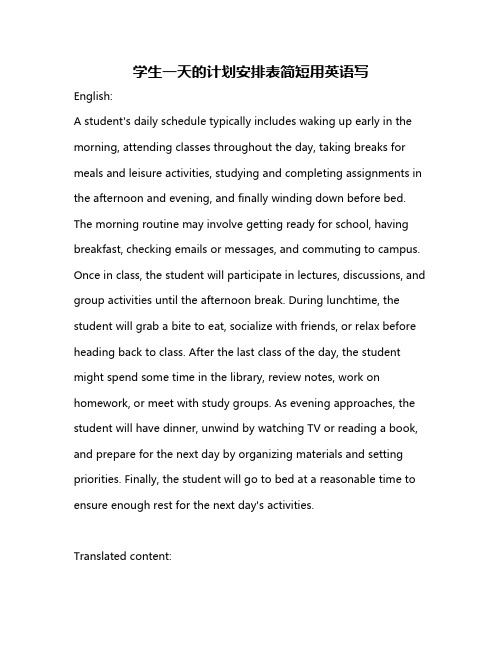
学生一天的计划安排表简短用英语写English:A student's daily schedule typically includes waking up early in the morning, attending classes throughout the day, taking breaks for meals and leisure activities, studying and completing assignments in the afternoon and evening, and finally winding down before bed. The morning routine may involve getting ready for school, having breakfast, checking emails or messages, and commuting to campus. Once in class, the student will participate in lectures, discussions, and group activities until the afternoon break. During lunchtime, the student will grab a bite to eat, socialize with friends, or relax before heading back to class. After the last class of the day, the student might spend some time in the library, review notes, work on homework, or meet with study groups. As evening approaches, the student will have dinner, unwind by watching TV or reading a book, and prepare for the next day by organizing materials and setting priorities. Finally, the student will go to bed at a reasonable time to ensure enough rest for the next day's activities.Translated content:学生一天的计划安排通常包括早上早早起床,整天上课,用餐和休闲活动休息,下午和晚上学习和完成任务,最后在睡前放松。
学习计划英语版带翻译
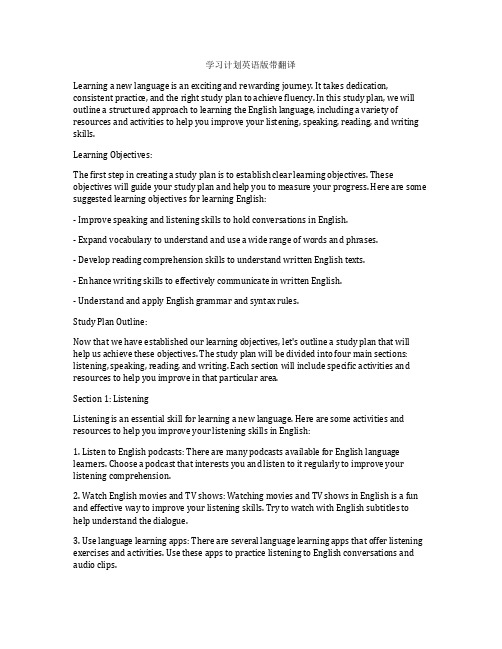
学习计划英语版带翻译Learning a new language is an exciting and rewarding journey. It takes dedication, consistent practice, and the right study plan to achieve fluency. In this study plan, we will outline a structured approach to learning the English language, including a variety of resources and activities to help you improve your listening, speaking, reading, and writing skills.Learning Objectives:The first step in creating a study plan is to establish clear learning objectives. These objectives will guide your study plan and help you to measure your progress. Here are some suggested learning objectives for learning English:- Improve speaking and listening skills to hold conversations in English.- Expand vocabulary to understand and use a wide range of words and phrases.- Develop reading comprehension skills to understand written English texts.- Enhance writing skills to effectively communicate in written English.- Understand and apply English grammar and syntax rules.Study Plan Outline:Now that we have established our learning objectives, let's outline a study plan that will help us achieve these objectives. The study plan will be divided into four main sections: listening, speaking, reading, and writing. Each section will include specific activities and resources to help you improve in that particular area.Section 1: ListeningListening is an essential skill for learning a new language. Here are some activities and resources to help you improve your listening skills in English:1. Listen to English podcasts: There are many podcasts available for English language learners. Choose a podcast that interests you and listen to it regularly to improve your listening comprehension.2. Watch English movies and TV shows: Watching movies and TV shows in English is a fun and effective way to improve your listening skills. Try to watch with English subtitles to help understand the dialogue.3. Use language learning apps: There are several language learning apps that offer listening exercises and activities. Use these apps to practice listening to English conversations and audio clips.Section 2: SpeakingSpeaking is an important part of language learning, as it helps you practice pronunciation and develop fluency. Here are some activities and resources to help you improve your speaking skills in English:1. Practice speaking with native speakers: Finding a conversation partner or language exchange partner is a great way to practice speaking in English. Look for language exchange meetups or use language exchange websites to find a partner.2. Attend English conversation classes: Many language schools and community centers offer English conversation classes. Joining a conversation class will give you the opportunity to practice speaking with other learners and receive feedback from a teacher.3. Record yourself speaking: Record yourself speaking in English and listen to the recording. This will help you identify areas for improvement and track your progress over time. Section 3: ReadingReading is a valuable way to improve vocabulary, comprehension, and grammar skills. Here are some activities and resources to help you improve your reading skills in English:1. Read books and articles in English: Choose books and articles that interest you and read them regularly. Start with materials that are appropriate for your language level and gradually challenge yourself with more complex texts.2. Use reading comprehension exercises: Many language learning websites and apps offer reading comprehension exercises. Use these exercises to practice reading and answering questions about the text.3. Join a book club or reading group: Joining a book club or reading group will give you the opportunity to discuss books with other English language learners and practice your reading skills in a social setting.Section 4: WritingWriting is an important skill for effectively communicating in English. Here are some activities and resources to help you improve your writing skills in English:1. Write regularly: Set aside time each day to write in English. You can write in a journal, write emails to friends, or even start a blog in English. The key is to practice writing regularly to improve your skills.2. Use writing prompts: Use writing prompts to help inspire your writing. There are many websites and books that offer writing prompts for English language learners.3. Get feedback on your writing: Seek feedback from a teacher, tutor, or language exchange partner on your writing. Constructive feedback will help you identify areas for improvement and work towards writing more effectively.Study Schedule:Now that we have outlined activities and resources for each section of the study plan, let's create a weekly study schedule. It's important to set aside dedicated time for language learning each week to stay consistent and make progress. Here is an example of a weekly study schedule for learning English:Monday- 30 minutes: Listen to an English podcast- 30 minutes: Practice speaking with a language exchange partnerTuesday- 30 minutes: Watch an English movie or TV show with subtitles- 30 minutes: Read a book or article in EnglishWednesday- 30 minutes: Use a language learning app for listening exercises- 30 minutes: Attend an English conversation classThursday- 30 minutes: Record yourself speaking in English and listen to the recording- 30 minutes: Use reading comprehension exercises on a language learning website Friday- 30 minutes: Write in your English journal or practice writing prompts- 30 minutes: Get feedback on your writing from a teacher, tutor, or language exchange partnerSaturday- 1 hour: Review vocabulary and grammar- 1 hour: Practise listening, speaking, reading, and writing activitiesSunday- Rest and relax- Reflect on your progress and set goals for the upcoming weekFinal Thoughts:Learning a new language takes time and effort, but with a structured study plan and consistent practice, you can achieve fluency in English. Use this study plan as a guide, butfeel free to modify it based on your specific learning needs and goals. Remember to stay patient and persistent, and celebrate your progress along the way. Good luck on your language learning journey!学习计划学习一门新语言是一次令人兴奋和有益的旅程。
数学学习计划表
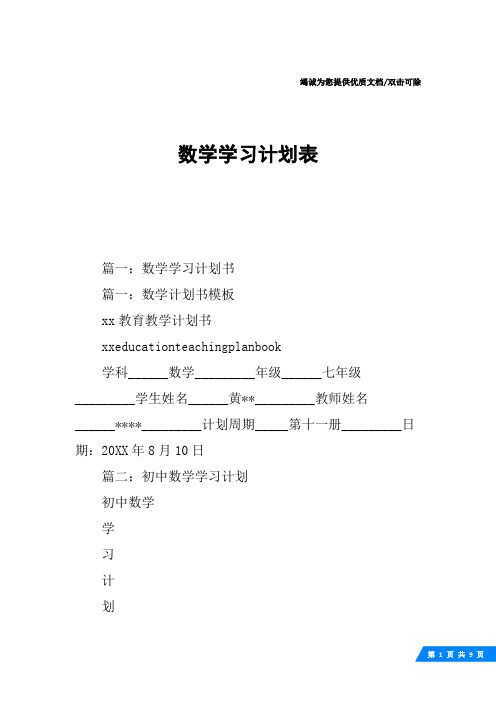
竭诚为您提供优质文档/双击可除数学学习计划表篇一:数学学习计划书篇一:数学计划书模板xx教育教学计划书xxeducationteachingplanbook学科______数学_________年级______七年级_________学生姓名______黄**_________教师姓名______****_________计划周期_____第十一册_________日期:20XX年8月10日篇二:初中数学学习计划初中数学学习计划初中数学学习计划数学的学习有一个循序渐进的过程,妄想一步登天是不现实的。
熟记书本内容后将书后习题认真写好,有些同学可能认为书后习题太简单不值得做,这种想法是极不可取的,书后习题的作用不仅帮助你将书本内容记牢,还辅助你将书写格式规范化,从而使自己的解题结构紧密而又严整,公式定理能够运用的恰如其分,以减少考试中无谓的失分。
1、按部就班:数学是环环相扣的一门学科,哪一个环节脱节都会影响整个学习的进程。
所以,平时学习不应贪快,要一章一章过关,不要轻易留下自己不明白或者理解不深刻的问题。
2、强调理解:概念、定理、公式要在理解的基础上记忆。
每新学一个定理,尝试先不看答案,做一次例题,看是否能正确运用新定理;若不行,则对照答案,加深对定理的理解。
3、基本训练:学习数学是不能缺少训练的,平时多做一些难度适中的练习,当然莫要陷入死钻难题的误区,要熟悉考试中的题型,训练要做到有的放矢。
4、重视平时考试出现的错误:订一个错题本,专门搜集自己的错题,这些往往就是自己的薄弱之处。
复习时,这个错题本也就成了宝贵的复习资料。
考试篇攻略一:概念记清,基础夯实。
数学≠做题,千万不要忽视最基本的概念、公理、定理和公式,特别是不定项选择题就要靠清晰的概念来明辨对错,如果概念不清就会感觉模棱两可,最终造成误选。
因此,要把已经学过的六本教科书中的概念整理出来,通过读一读、抄一抄加深印象,特别是容易混淆的概念更要彻底搞清,不留隐患。
学习计划表模板

学习计划表模板学习计划表是帮助我们合理安排学习时间、提高学习效率的重要工具。
一个合理的学习计划可以帮助我们更好地掌握知识,提高学习成绩。
下面是一个学习计划表模板,希望能够对大家有所帮助。
学习计划表。
姓名,______________________ 年级,______________________。
日期,______________________。
时间段 | 学习科目/内容 | 学习任务/目标。
8:00-9:00 | 数学 | 复习上节课内容,预习下节课内容。
9:00-10:00 | 英语 | 完成一篇阅读理解练习。
10:00-10:30 | 休息 | 休息时间,放松身心。
10:30-11:30 | 物理 | 做一套物理习题。
11:30-12:00 | 午餐 | 用餐时间,保证营养。
12:00-13:30 | 自习 | 复习上午学习内容,预习下午课程。
13:30-15:00 | 化学 | 完成化学实验报告。
15:00-15:30 | 休息 | 休息时间,放松身心。
15:30-17:00 | 历史 | 复习历史知识点。
17:00-18:00 | 体育 | 参加体育课训练。
18:00-19:00 | 晚餐 | 用餐时间,保证营养。
19:00-20:30 | 英语 | 复习英语单词和语法。
20:30-21:30 | 综合 | 复习各科目知识点。
21:30-22:00 | 休息 | 放松时间,准备睡眠。
以上是一个学习计划表的模板,大家可以根据自己的实际情况进行合理调整。
制定学习计划时,需要考虑到自己的学习习惯、学习能力、课外活动等因素,合理安排学习时间,避免贪多嚼不烂,导致学习效果不佳。
在制定学习计划时,我们还需要注意以下几点:1. 合理安排时间,根据自己的学习情况和生活习惯,合理安排每天的学习时间,保证充足的休息时间和学习时间的合理利用。
2. 明确学习目标,制定学习计划时,要明确每个学习时间段的学习目标,包括复习内容、预习内容、练习题目等,确保学习任务明确清晰。
自律者自知的学习计划表

序号
学习阶段
时间安排
学习内容
学习目标
自我检查点
自我激励措施
1
确定目标阶段
第1天
确定长期与短期学习目标,分析自身优势与不足
明确学习方向,找到自我提升的关键点
列出目标清单
设定达成目标后的奖励
2
计划制定阶段
第2天
制定具体学习计划,细化到每日任务
保证学习进度的有序进行
制定每周/每日学习计划表
5
复习巩固阶段
每周六
对本周所学进行系统复习,查漏补缺
巩固记忆,加深理解
制作思维导图,进行定期模拟测试
连续几周无错题或提升显著可给予自我奖励
6
反馈调整阶段
每月最后一周
总结本月学习情况,评估目标完成度,调整下一月计划
动态适应学习需求,对比上月进步,为持续进步设立新的动力源
设定每完成一项任务即打卡记录
3
知识积累阶段
每周一至周五
按照计划进行课程学习、阅读文献资料等
提升专业基础知识与技能
每日回顾所学知识点,整理笔记
每周末对自己本周学习成果进行小结
4
实践应用阶段
根据实际情况插入
完成课后习题、实验操作、项目实践等
将理论知识转化为实践技能
定期提交作业并自查,接受他人或导师反馈
针对每次实践结果调整优化学习方法
读书计划单制作方法

读书计划单制作方法英文回答:Creating a study plan can be a helpful way to stay organized and motivated while reading. Here is a step-by-step guide on how to make a study plan for reading:1. Set clear goals: Start by defining what you want to achieve through your reading. Are you trying to learn something specific? Are you reading for pleasure? Knowing your goals will help you structure your study plan accordingly.2. Assess your current reading habits: Take a moment to reflect on your current reading habits. How much time do you spend reading each day? What types of books or materials do you enjoy? Understanding your current habits will help you identify areas for improvement.3. Determine your available time: Look at your scheduleand identify blocks of time that you can dedicate to reading. This could be during your commute, before bed, or during your lunch break. Be realistic about how much time you can commit to reading each day.4. Prioritize your reading materials: If you have a long list of books you want to read, prioritize them based on your goals and interests. This will help you stay focused and prevent you from feeling overwhelmed.5. Break it down: Divide your reading time into manageable chunks. For example, if you have an hour of dedicated reading time, you can break it down into two 30-minute sessions or four 15-minute sessions. This will make it easier to stay focused and avoid burnout.6. Create a reading schedule: Use a planner or a digital calendar to create a reading schedule. Assign specific books or chapters to each day or week, depending on your reading speed and goals. Having a schedule will help you stay on track and ensure that you're making progress.7. Mix it up: Don't be afraid to diversify your reading materials. Read different genres, authors, or even non-fiction books on a variety of topics. This will help keep your reading experience engaging and prevent boredom.8. Track your progress: Keep a reading journal or use a reading tracking app to record your progress. This will give you a sense of accomplishment and motivate you to keep going.9. Stay accountable: Find a study buddy or join a book club to stay accountable. Discussing your reading progress with others can be motivating and provide a fresh perspective on the books you're reading.10. Adjust as needed: Be flexible with your study plan and adjust it as needed. If you find that you're not enjoying a particular book or that your schedule is too demanding, make changes accordingly. Remember, the goal is to enjoy the process of reading and learn something new.中文回答:制定一个读书计划可以帮助我们保持组织和动力。
学习计划表

7
掌握点
附加
情境教学(听、说)
8
boy,girl,children,father,classmate,family,mother,sister,friend,one,two,three,five,seven,eig nine,four,six,ten,a doll,a car,a ball,a teddy bear,blue,a robot,a bus,red,black,yellow,pink 重点单词 toy,brown,white,a pencil,an eraser,a pencil,aneraser,a pencil case,green,a pen,a ruler, a sharpener,skip,read a book,climb,swim,write a story,jump,sing a song,eye,draw,run,walk,ea nose,mouth,glasses,big ears,long hair,curly hair,thin,short,small eyes,short hair,fat,tall 单词的规范书写(读、写) 附加
hank you.What is you name?My name is.. his is … He/She is my friend. se your books,please. Don't talk in t is… This is… It has… They have 听) 设置情境,与学生进行角色扮演,并嵌入本册所学 读、写各方面的能力。通过十次课的学习,学生能
说) 学习用品的名称 描述自己和他人文具用品的数量 p(pencil) -en(pen)的发音
写法与读法
学习各种动物的英文名称 表达自己的爱好 描述动物的形态特征 c(cow) -at(cat)的发音 积累(读、写) 身体各个部位的英文单词 介绍他人并对他人特征进行描述 d(dog) -og(dog)的发音
小学生英语优秀学习计划表

小学生英语优秀学习计划表小学生英语优秀学习计划表时光飞逝,时间在慢慢推演,我们的工作同时也在不断更新迭代中,是时候开始制定计划了。
计划怎么写才不会流于形式呢?下面是小编精心整理的小学生英语优秀学习计划表,希望能够帮助到大家。
一、高效率的学习方法1、高效记忆方法语言学习者要记忆大量的词汇,背诵英语单词、短语是每一个英语学习者面临的艰巨任务,也是令每一个英语学习者感到棘手的问题。
成人如此,小学生也不例外。
因此,在英语学习的启蒙阶段,让小学生了解单词记忆的一些策略是十分必要的。
(1)读音记忆法:根据单词的读音记忆单词。
它是记忆策略的首选,也是学好英语的重要途径。
在教学中,我们经常会发现一些学生能够阅读,也会用英语写作,却不会用英语与人交流,甚至在课堂上不敢张开嘴巴说,即出现所谓的“哑巴英语”现象。
根据读音记忆单词,既可以避免“哑巴英语”现象,又能培养学生良好的英语学习习惯,提高学习效率。
(2)联想记忆法:设法把单词的音或形或义联系起来。
人的记忆能力,主要来自联想。
记忆力强的人,都具有较强的联想能力。
记忆以联想为基础,联想的建立为记忆提供更多的线索,线索越多,记住一个单词就越容易,提取这个单词也就越顺利。
我们可以总结出以下几种联想法:拼写联想,将拼写类似的单词集中在一起记忆,如:book,cook,look;bar,car,far,farm;boy,toy;bee,see,tree等。
意义联想,从词义方面联想与其有相近或相反关系的单词。
如:同义词good——nice;反义词good——bad;old—— young;tall——short。
归类联想,即将同类单词集中在一起记忆。
如由red联想到各种颜色:green,yellow,brown,white,purple,blue,orange,black,pink;由eye联想到身体各部分:head,face,ear,nose,arm,heel,elbow,hand,finger,leg,foot,toe等。
英文一周学习计划带翻译

英文一周学习计划带翻译Introduction:Learning is an essential part of life, and having a structured study plan in place can help individuals make the most of their time and efforts. In this one week study plan, we will outline a comprehensive schedule for effective learning, covering a variety of subjects and activities.Day 1:Subject: MathematicsTime: 2 hoursDescription: Spend the morning working on mathematical problems, focusing on algebra and geometry. Practice solving equations and geometric proofs to reinforce understanding and improve problem-solving skills.Subject: Language LearningTime: 1 hourDescription: In the afternoon, dedicate an hour to learning a new language or practicing language skills. This could involve using language learning apps, studying vocabulary, and engaging in conversation with a native speaker.Subject: ExerciseTime: 1 hourDescription: Incorporate exercise into the daily routine by going for a run, practicing yoga, or engaging in any other physical activity for an hour.Day 2:Subject: HistoryTime: 2 hoursDescription: Spend the morning studying a specific period in history, focusing on key events, people, and their impact on the world. Use different resources, such as books, documentaries, and online articles, to gain a comprehensive understanding.Subject: ScienceTime: 1 hourDescription: In the afternoon, delve into a scientific topic of interest, whether it's biology, chemistry, physics, or environmental science. Conduct experiments, watch educational videos, and read scientific journals to expand knowledge in this area.Subject: Creative WritingTime: 1 hourDescription: Dedicate an hour to creative writing, whether it's working on a short story, poem, or personal journal. Writing can help improve language skills and foster creativity.Day 3:Subject: ArtTime: 2 hoursDescription: Spend the morning exploring different forms of art, such as painting, drawing, sculpting, or photography. Engage in a hands-on art project or visit a local art museum for inspiration.Subject: PhilosophyTime: 1 hourDescription: In the afternoon, delve into philosophical concepts and theories, contemplating the nature of existence, ethics, and the universe. Read philosophical texts and engage in discussions to expand critical thinking skills.Subject: MusicTime: 1 hourDescription: Dedicate an hour to music appreciation, whether it's listening to different genres, learning to play an instrument, or studying music theory.Day 4:Subject: TechnologyTime: 2 hoursDescription: Spend the morning exploring technological advancements and innovations, ranging from artificial intelligence to blockchain technology. Watch TED talks, read tech news, and explore coding tutorials to gain insights into the world of technology.Subject: GeographyTime: 1 hourDescription: In the afternoon, study different geographical regions, climates, and cultures around the world. Use maps, books, and online resources to gain a deeper understanding of the world we live in.Subject: MeditationTime: 1 hourDescription: Dedicate an hour to meditation and mindfulness practices, promoting mental clarity and relaxation.Day 5:Subject: Business and EconomicsTime: 2 hoursDescription: Spend the morning studying business strategies, economic theories, and financial markets. Read business journals, watch financial news, and analyze case studies to gain valuable insights.Subject: PsychologyTime: 1 hourDescription: In the afternoon, delve into psychological theories and concepts, understanding human behavior, emotions, and mental processes. Read psychology textbooks, watch educational videos, and engage in self-reflection.Subject: CookingTime: 1 hourDescription: Dedicate an hour to cooking or baking, experimenting with new recipes and culinary skills.Day 6:Subject: Environmental StudiesTime: 2 hoursDescription: Spend the morning learning about environmental issues, sustainability, and conservation efforts. Watch documentaries, read environmental reports, and engage in discussions about pressing environmental concerns.Subject: Current EventsTime: 1 hourDescription: In the afternoon, stay informed about current events and global news. Read articles from reputable news sources, listen to podcasts, and engage in discussions about the latest developments.Subject: Volunteer WorkTime: 1 hourDescription: Dedicate an hour to volunteer work, whether it's helping out at a local charity, participating in a community service project, or supporting a cause that's meaningful.Day 7:Subject: Review and ReflectionTime: 2 hoursDescription: Spend the day reflecting on the week's learning experience, identifying areas of improvement and setting goals for future learning endeavors. Review key concepts, create study notes, and prepare for the week ahead.Subject: Relaxation and LeisureTime: 2 hoursDescription: In the afternoon, take time to relax and engage in leisure activities that bring joy and relaxation, whether it's reading a book, watching a movie, or spending time with loved ones.Conclusion:Having a structured study plan can help individuals make the most of their time and efforts, allowing for comprehensive learning experiences across various subjects and activities. By following this one week study plan, individuals can expand their knowledge, foster critical thinking skills, and promote overall personal growth and development.中文翻译:一周学习计划导言:学习是生活中至关重要的一部分,而制定一个有序的学习计划可以帮助人们充分利用他们的时间和努力。
数学学习计划表

数学学习计划表篇一:数学学习计划书篇一:数学计划书模板xx教育教学计划书xx education teaching plan book学科______数学_________ 年级______七年级_________ 学生姓名______黄**_________ 教师姓名______****_________ 计划周期_____第十一册_________ 日期: XX 年 8月 10 日篇二:初中数学学习计划初中数学学习计划初中数学学习计划数学的学习有一个循序渐进的过程,妄想一步登天是不现实的。
熟记书本内容后将书后习题认真写好,有些同学可能认为书后习题太简单不值得做,这种想法是极不可取的,书后习题的作用不仅帮助你将书本内容记牢,还辅助你将书写格式规范化,从而使自己的解题结构紧密而又严整,公式定理能够运用的恰如其分,以减少考试中无谓的失分。
1、按部就班:数学是环环相扣的一门学科,哪一个环节脱节都会影响整个学习的进程。
所以,平时学习不应贪快,要一章一章过关,不要轻易留下自己不明白或者理解不深刻的问题。
2、强调理解:概念、定理、公式要在理解的基础上记忆。
每新学一个定理,尝试先不看答案,做一次例题,看是否能正确运用新定理;若不行,则对照答案,加深对定理的理解。
3、基本训练:学习数学是不能缺少训练的,平时多做一些难度适中的练习,当然莫要陷入死钻难题的误区,要熟悉考试中的题型,训练要做到有的放矢。
4、重视平时考试出现的错误:订一个错题本,专门搜集自己的错题,这些往往就是自己的薄弱之处。
复习时,这个错题本也就成了宝贵的复习资料。
考试篇攻略一:概念记清,基础夯实。
数学≠做题,千万不要忽视最基本的概念、公理、定理和公式,特别是不定项选择题就要靠清晰的概念来明辨对错,如果概念不清就会感觉模棱两可,最终造成误选。
因此,要把已经学过的六本教科书中的概念整理出来,通过读一读、抄一抄加深印象,特别是容易混淆的概念更要彻底搞清,不留隐患。
小学生学习计划表1
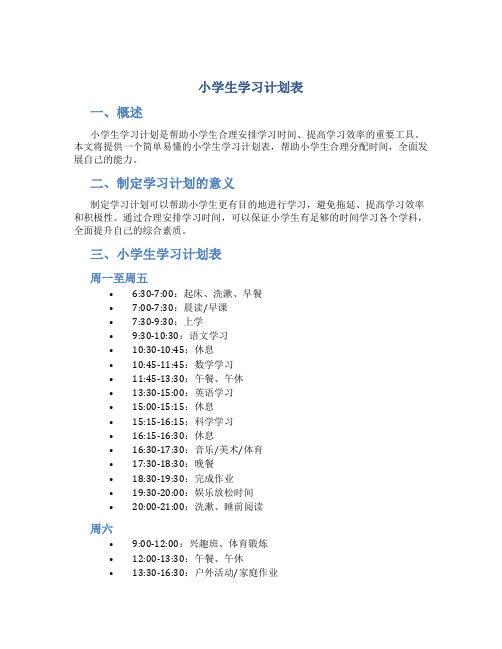
小学生学习计划表一、概述小学生学习计划是帮助小学生合理安排学习时间、提高学习效率的重要工具。
本文将提供一个简单易懂的小学生学习计划表,帮助小学生合理分配时间,全面发展自己的能力。
二、制定学习计划的意义制定学习计划可以帮助小学生更有目的地进行学习,避免拖延、提高学习效率和积极性。
通过合理安排学习时间,可以保证小学生有足够的时间学习各个学科,全面提升自己的综合素质。
三、小学生学习计划表周一至周五•6:30-7:00:起床、洗漱、早餐•7:00-7:30:晨读/早课•7:30-9:30:上学•9:30-10:30:语文学习•10:30-10:45:休息•10:45-11:45:数学学习•11:45-13:30:午餐、午休•13:30-15:00:英语学习•15:00-15:15:休息•15:15-16:15:科学学习•16:15-16:30:休息•16:30-17:30:音乐/美术/体育•17:30-18:30:晚餐•18:30-19:30:完成作业•19:30-20:00:娱乐放松时间•20:00-21:00:洗漱、睡前阅读周六•9:00-12:00:兴趣班、体育锻炼•12:00-13:30:午餐、午休•13:30-16:30:户外活动/家庭作业•16:30-18:30:家庭亲子时间•18:30-19:30:晚餐•19:30-20:30:家庭共读、故事时间周日•早晨:起床、早餐•9:00-11:30:参加亲子活动•11:30-13:30:午餐、午休•13:30-15:30:阅读/写作练习•15:30-17:00:户外活动•17:00-18:00:完成未完成的作业•18:00-19:00:晚餐•19:00-20:00:准备明天的学习内容•20:00-21:00:洗漱、睡前阅读四、小学生学习计划的调整小学生学习计划应根据小学生的实际情况进行调整。
家长和老师应在实践中不断总结经验,根据小学生的性格特点和学习情况,适时调整学习计划,确保学习效果的达成。
制定三年级英语学习目标和计划表

制定三年级英语学习目标和计划表全文共5篇示例,供读者参考制定三年级英语学习目标和计划表篇1一、情况分析:学生对英语充满好奇,渴望通过新学期的学习获得更多的知识,以丰富自己的交际内容,提高交际能力。
本册教材所涉及的话题内容丰富,涉及的词汇和日常交际用语、句型也有所增加。
教学时应注意教材前后编排的连续性,以便教学时做到有的放矢,把新旧知识结合起来。
本册教科书共八个单元和两个实践活动,每单元各由七个板块组成;这些板块既相对独立、有所侧重,又紧密联系、相互呼应,教学中根据学生的实际情况将各个板块有机结合、合理安排,使他们相互渗透、融会贯通。
story time是情景对话板块。
该板块通过情景对话,着重训练学生的听说技能,以提高会话能力,同时还呈现新的词汇和句型。
fun time和cartoon time是每个单元的教学重点,一般都要求四会掌握。
这两板块句型都放在情景之中教学。
这样做,一能激发学生的求知欲;二能帮助学生理解句型的意思,了解句型使用的场合;三能防止操练时是枯燥乏味。
句型操练时教师还要注意训练的广度和密度,要让尽可能多的学生有训练的机会。
letter time板块的任务是让学生掌握26个字母。
这个活动要求较高,难度却不是很大。
学生有了一二年级的学习基础,教师在教学时要根据“由易到难,循序渐进”的原则,让学生在熟练地读和说的基础上,掌握字母的书写。
song time/rhyme time具有游戏和歌舞学习性质的活动板块。
本册教科书共安排了四首歌曲和四首歌谣。
教英语歌曲和歌谣不仅有利于激发学生的学习兴趣,培养他们的节奏感,还有利于提高其人文素养。
这个板块提供的饶有趣味的歌曲和诗歌有助于学生在唱中学,诵读中学习,对于激发学生的学习兴趣,提高学生运用语言的能力,发展学生的智力都有作用。
checking time/ticking time是检测和评价环节。
学生通过checkingtime的检测,并能通过tickingtime对自己的自评,总结单元学习掌握的情况。
个人新学期学习计划安排表
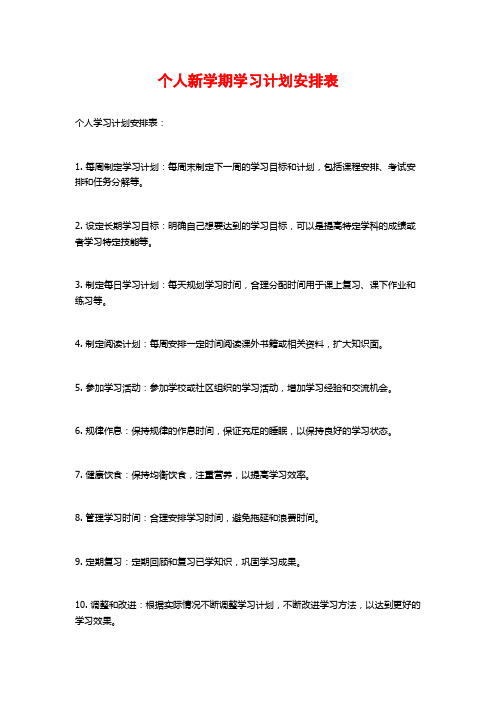
个人新学期学习计划安排表
个人学习计划安排表:
1. 每周制定学习计划:每周末制定下一周的学习目标和计划,包括课程安排、考试安排和任务分解等。
2. 设定长期学习目标:明确自己想要达到的学习目标,可以是提高特定学科的成绩或者学习特定技能等。
3. 制定每日学习计划:每天规划学习时间,合理分配时间用于课上复习、课下作业和练习等。
4. 制定阅读计划:每周安排一定时间阅读课外书籍或相关资料,扩大知识面。
5. 参加学习活动:参加学校或社区组织的学习活动,增加学习经验和交流机会。
6. 规律作息:保持规律的作息时间,保证充足的睡眠,以保持良好的学习状态。
7. 健康饮食:保持均衡饮食,注重营养,以提高学习效率。
8. 管理学习时间:合理安排学习时间,避免拖延和浪费时间。
9. 定期复习:定期回顾和复习已学知识,巩固学习成果。
10. 调整和改进:根据实际情况不断调整学习计划,不断改进学习方法,以达到更好的学习效果。
小学生学习计划表
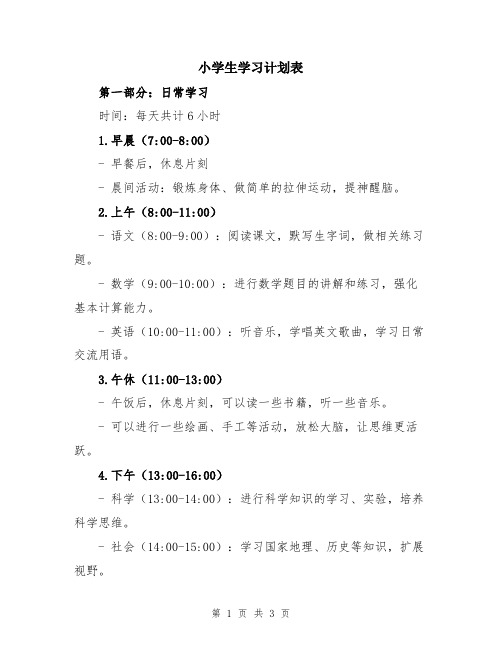
小学生学习计划表第一部分:日常学习时间:每天共计6小时1.早晨(7:00-8:00)- 早餐后,休息片刻- 晨间活动:锻炼身体、做简单的拉伸运动,提神醒脑。
2.上午(8:00-11:00)- 语文(8:00-9:00):阅读课文,默写生字词,做相关练习题。
- 数学(9:00-10:00):进行数学题目的讲解和练习,强化基本计算能力。
- 英语(10:00-11:00):听音乐,学唱英文歌曲,学习日常交流用语。
3.午休(11:00-13:00)- 午饭后,休息片刻,可以读一些书籍,听一些音乐。
- 可以进行一些绘画、手工等活动,放松大脑,让思维更活跃。
4.下午(13:00-16:00)- 科学(13:00-14:00):进行科学知识的学习、实验,培养科学思维。
- 社会(14:00-15:00):学习国家地理、历史等知识,扩展视野。
- 体育(15:00-16:00):进行各种体育活动,锻炼身体,增强体质和协调能力。
第二部分:课后辅导时间:每天共计2小时1.辅导班时间(16:30-18:30)- 语文课辅导:对上午学习内容进行复习和巩固,帮助理解掌握。
- 数学课辅导:解答上午学习中遇到的难题,强化巩固数学知识。
- 英语课辅导:进行听、说、读、写的培训,提高英语综合运用能力。
第三部分:个人兴趣培养时间:每天共计1小时1.兴趣培养时间(19:00-20:00)- 音乐学习:学习演奏乐器、唱歌、音乐理论知识等。
- 美术学习:学习绘画、设计、手工制作等。
- 体育锻炼:进行更具挑战性的体育运动,如游泳、篮球等。
第四部分:课外阅读时间:每天共计1小时1.阅读时间(20:00-21:00)- 阅读各类书籍:科普读物、文学作品、传记等,扩展阅读面,丰富知识。
第五部分:睡眠时间时间:每天共计9小时1.就寝时间(21:00-6:00)- 保证充足的睡眠,有助于身心的健康发展。
小学生学习计划表的制定原则:- 完善的时间分配,合理利用每天的时间。
- 1、下载文档前请自行甄别文档内容的完整性,平台不提供额外的编辑、内容补充、找答案等附加服务。
- 2、"仅部分预览"的文档,不可在线预览部分如存在完整性等问题,可反馈申请退款(可完整预览的文档不适用该条件!)。
- 3、如文档侵犯您的权益,请联系客服反馈,我们会尽快为您处理(人工客服工作时间:9:00-18:30)。
教育实践活动集中学习计划表
学习内容 学习习近平总书记一系列重要讲话精神和关于坚持群众路线的重要论Байду номын сангаас等 党章、《党的十八大以来作风建设文件汇编》 学习中央八项规定、省委十项规定、市委市政府《关于改进工作作风密切联系群众的实施 学习厉行节约、反对浪费重要论述等 三问五心等学习资料 习的篇目外,其余内容个人自学。
学习形式 集中学习 集中学习 集中学习 集中学习 集中学习
